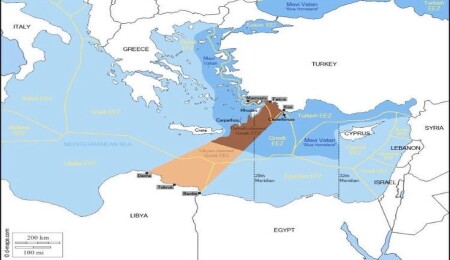Libyan Government Rejects Greek Objections to Deal with Turkey

Libya’s eastern-based government has firmly rejected recent Greek objections to the 2019 maritime boundary agreement signed between Turkey and the Tripoli-based Libyan government, asserting that the deal remains legitimate under international law.

Prime Minister Osama Hammad, representing the Benghazi-based administration, stated that the Turkey-Libya deal is "internationally legitimate" and warned against any external interference in Libya’s sovereign decisions.
“Libya will not accept any challenge to its rights,” he said, adding that the country retains the right to respond decisively to any actions threatening its territorial integrity or political sovereignty. He also accused Greece of pursuing a "policy of provocation and escalation."
Hammad stressed that Libya’s maritime rights are non-negotiable and must be discussed only within internationally recognized legal frameworks. He noted that decisive steps were taken in response to Athens’ recent positions and warned that continued Greek objections would trigger consequences.
The Tripoli government and Turkey signed the maritime boundary agreement in 2019, which delineated exclusive economic zones in the eastern Mediterranean. In 2022, the two sides expanded the deal with a memorandum granting Turkey exploration rights both offshore and on Libyan territory.
Recently, Libya’s eastern-based administration has decided to establish a technical committee to reexamine the 2019 maritime deal. The move is seen as part of a recent thaw in relations between Ankara and the eastern Libyan administration.
The flare-up followed the signing of a new memorandum of understanding on June 25 between Turkey’s state-owned energy company TPAO and Libya’s National Oil Corporation (NOC), aimed at conducting seismic research in areas covered by the 2019 maritime boundary deal.
Greek Prime Minister Kyriakos Mitsotakis brought the issue to the European Union summit in Brussels last week, once again questioning the validity of Turkey’s maritime agreements with Libya.
The summit’s final communique emphasized that the Turkey–Libya memorandum “violates the sovereign rights of third countries and is not in line with the international law.”
Additionally, the EU Council deemed the memorandum unlawful and expressed support for the positions of Greece and the Greek Cypriot Administration.
In response, Turkey said that the outcomes of the EU leaders' summit show that Greece and Greek Cyprus continue efforts to “impose their maximalist claims.”
The deal is an “entirely legitimate agreement" under international law, Turkish Foreign Ministry Spokesman Öncü Keçeli wrote on X.
"In this regard, instead of endorsing legally invalid claims, the EU should call on all its members to comply with international law," he said.
Source: HDN












Yorumlar
Dikkat!
Suç teşkil edecek, yasadışı, tehditkar, rahatsız edici, hakaret ve küfür içeren, aşağılayıcı, küçük düşürücü, kaba, müstehcen, ahlaka aykırı, kişilik haklarına zarar verici ya da benzeri niteliklerde içeriklerden doğan her türlü mali, hukuki, cezai, idari sorumluluk içeriği gönderen Üye/Üyeler’e aittir.